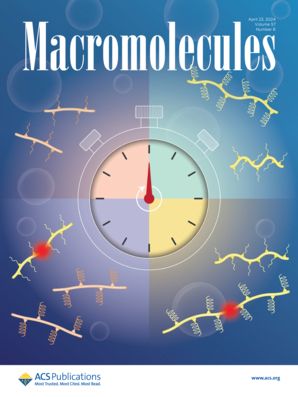Thermomechanical Characterization of High Tg Disulfide-Containing Thermoplastic Polyimides
IF 5.1
1区 化学
Q1 POLYMER SCIENCE
引用次数: 0
Abstract
Covalent adaptable networks are frequently studied as alternatives to conventional thermosetting polymers because they can be recycled and reprocessed; however, the inclusion of dynamic covalent bonds within high-temperature (or high-performance) engineering thermoplastics remains largely unexplored. In this work, dynamic disulfide-containing thermoplastic polyimides were synthesized and compared to nondynamic thermoplastic polyimides. The thermomechanical properties of these polymers were examined by utilizing several techniques, including thermogravimetric analysis, differential scanning calorimetry, along with the use of the rheometric quartz crystal microbalance, and traditional dynamic mechanical analysis. The resulting experimental data suggest that the thermal stability of the dynamic compositions was slightly reduced in comparison to the nondynamic analogs, but the dynamic compositions exhibit a similar mechanical response under service conditions. The dynamic compositions also demonstrated significantly easier reprocessability via compression molding than their nondynamic counterparts.

求助全文
约1分钟内获得全文
求助全文
来源期刊

Macromolecules
工程技术-高分子科学
CiteScore
9.30
自引率
16.40%
发文量
942
审稿时长
2 months
期刊介绍:
Macromolecules publishes original, fundamental, and impactful research on all aspects of polymer science. Topics of interest include synthesis (e.g., controlled polymerizations, polymerization catalysis, post polymerization modification, new monomer structures and polymer architectures, and polymerization mechanisms/kinetics analysis); phase behavior, thermodynamics, dynamic, and ordering/disordering phenomena (e.g., self-assembly, gelation, crystallization, solution/melt/solid-state characteristics); structure and properties (e.g., mechanical and rheological properties, surface/interfacial characteristics, electronic and transport properties); new state of the art characterization (e.g., spectroscopy, scattering, microscopy, rheology), simulation (e.g., Monte Carlo, molecular dynamics, multi-scale/coarse-grained modeling), and theoretical methods. Renewable/sustainable polymers, polymer networks, responsive polymers, electro-, magneto- and opto-active macromolecules, inorganic polymers, charge-transporting polymers (ion-containing, semiconducting, and conducting), nanostructured polymers, and polymer composites are also of interest. Typical papers published in Macromolecules showcase important and innovative concepts, experimental methods/observations, and theoretical/computational approaches that demonstrate a fundamental advance in the understanding of polymers.
 求助内容:
求助内容: 应助结果提醒方式:
应助结果提醒方式:


